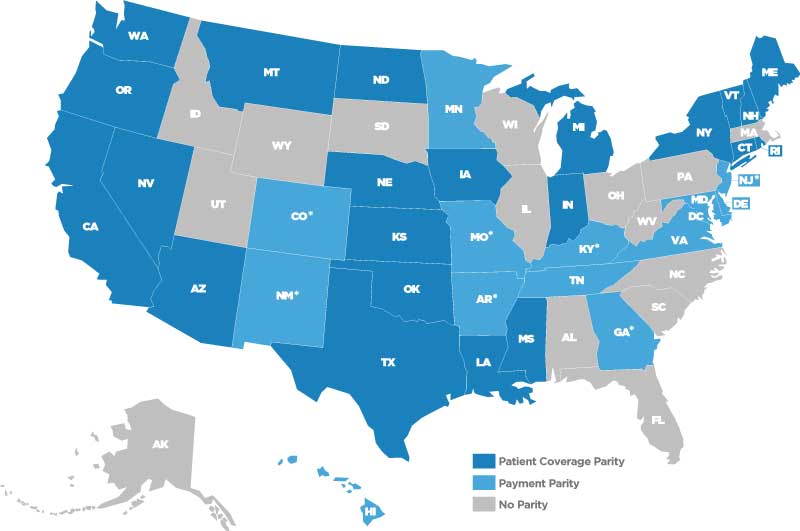COVID-19 Leads to Telemedicine Expansion
The COVID-19 pandemic has changed every industry worldwide. While some industries are struggling to regain a sense of normalcy four months into the pandemic, the current state of the world could be a tipping point for the use of telemedicine.
In March of 2020, all 50 states passed temporary actions of some kind to remove barriers to telehealth access. According to research done by Knowable Magazine, telemedicine usage jumped by nearly 20% between February and May of 2020. As state governors, insurance companies, doctors, and patients realize that telemedicine is here to stay, many are making efforts to make those temporary laws more permanent.
Past, Present, and Future of Parity Laws
Telehealth parity laws have been a major barrier in the struggle for broad usage of telemedicine. These laws allow for reimbursement of telehealth services at the same rate of in-person care. As of 2019, 34 states had parity laws in place, 4 had proposed parity laws within the house or senate, and 11 states had no parity laws whatsoever. Even in states with parity, each set of laws is different, and parity does not always equal pay equity, which limits accessibility for patients on Medicare. (For more information on state-by-state parity, read our blog discussing pre-COVID laws here.)
In an article for Smithsonian Magazine, doctors and telehealth providers discuss what a post-COVID world means for telehealth. One of the doctors interviewed is Joe Smith, cardiologist, and coauthor of an overview of telemedicine in the Annual Review of Biomedical Engineering.
“I don’t think we go back,” Smith stated in Smithsonian. “For a long time, hospitals have been the cathedrals of health care where patients have to come. But people are now seeing that they can get their health care in the safety and comfort of their own home.”
Telehealth Taskforce
In late June, once it became clear the COVID-19 pandemic was far from over, a coalition of 340 organizations sent a letter to Congress urging leaders to make telehealth reform permanent. The letter asks Congressional leaders to focus on these priorities:
- Remove obsolete restrictions on the location of the patient
- Maintain and enhance the Department of Health and Human Services’ (HHS) authority to determine appropriate providers and services for telehealth
- Ensure Federally Qualified Health Centers and rural health clinics can furnish telehealth services after the public health emergency ends
- Permanently authorize HHS to issue temporary waivers during public health emergencies
If passed, these reforms could increase access to telehealth care for millions of Americans.
States Making Progress
In the meantime, a number of states are making advances on their own to make temporary policy changes permanent.
Idaho & Colorado
On June 22, Idaho governor Brad Little signed an executive order to make the state’s temporarily loosened restrictions around telehealth permanent.
“Our loosening of health care rules since March helped to increase the use of telehealth services, made licensing easier, and strengthened the capacity of our health care workforce, all necessary to help our citizens during the global pandemic,” Little said. “We proved we could do it without compromising safety. Now it’s time to make those health care advances permanent moving forward.”
Idaho is still one of the 11 states still without telehealth parity, but this new executive order could lead to greater progress down the road.
On July 6, Colorado also passed a permanent bill that expands Medicaid coverage for telehealth services, in a huge victory for rural health clinics and patients. This coverage will include speech therapy, physical therapy, occupational therapy, and pediatric behavioral health care.
Tennessee & New Hampshire
In Tennessee, a state with parity laws but not “true parity”, Governor Bill Lee eased telehealth restrictions in March. Now, State Representative Robin Smith is attempting to pass a bill to make those measures permanent. Pay equity is the central dispute between the state House and Senate, which have yet to agree on the bill.
New Hampshire is also attempting to make Governor Chris Sununu’s emergency telehealth order, which allowed all health care providers to offer services remotely and required insurers to cover them, permanent. The bill has passed the House and is now waiting to be endorsed by a Senate committee.
The Future of Telehealth
In a time where the only thing known for certain is that nothing is certain, an expansion of telehealth laws nationwide could bring a bit of certainty to millions of Americans. Now that decision-makers are more fully realizing the benefits of telemedicine and engaging in previously un-had conversations about these benefits, we are hopeful telehealth parity could become law nationwide.
SOURCES:
https://visuwell.io/telemedicine-reimbursement/
https://mhealthintelligence.com/news/idaho-governor-makes-covid-19-telehealth-expansion-permanent
https://www.idahopress.com/eyeonboise/governor-makes-eased-telehealth-regulations-permanent-signs-executive-order/article_904d315f-eb64-5076-b98a-e51630e30b66.html
https://www.govtech.com/policy/Tennessee-State-Lawmakers-Debate-Telemedicine-Bill.html
https://www.nashuatelegraph.com/news/coronavirus/2020/06/06/telehealth-expansion-in-new-hampshire-could-become-permanent-after-pandemic/
https://www.businessinsider.com/new-bill-asks-congress-make-telehealth-coverage-permanent-2020-6
https://mhealthintelligence.com/news/fcc-boosts-rural-health-program-funding-to-support-telehealth-expansion
https://www.healthleadersmedia.com/innovation/340-organizations-plead-congress-permanent-telehealth-reform
https://mhealthintelligence.com/news/telehealth-advocates-launch-task-force-to-lobby-for-permanent-policy-changes
https://www.smithsonianmag.com/innovation/is-covid-19-tipping-point-for-telemedicine-180975131/





